Module 8 Choosing presents Unit 3 Language in use.课件(共30张PPT)
文档属性
| 名称 | Module 8 Choosing presents Unit 3 Language in use.课件(共30张PPT) |  | |
| 格式 | zip | ||
| 文件大小 | 1.6MB | ||
| 资源类型 | 试卷 | ||
| 版本资源 | 外研版 | ||
| 科目 | 英语 | ||
| 更新时间 | 2021-10-15 20:22:14 | ||
图片预览



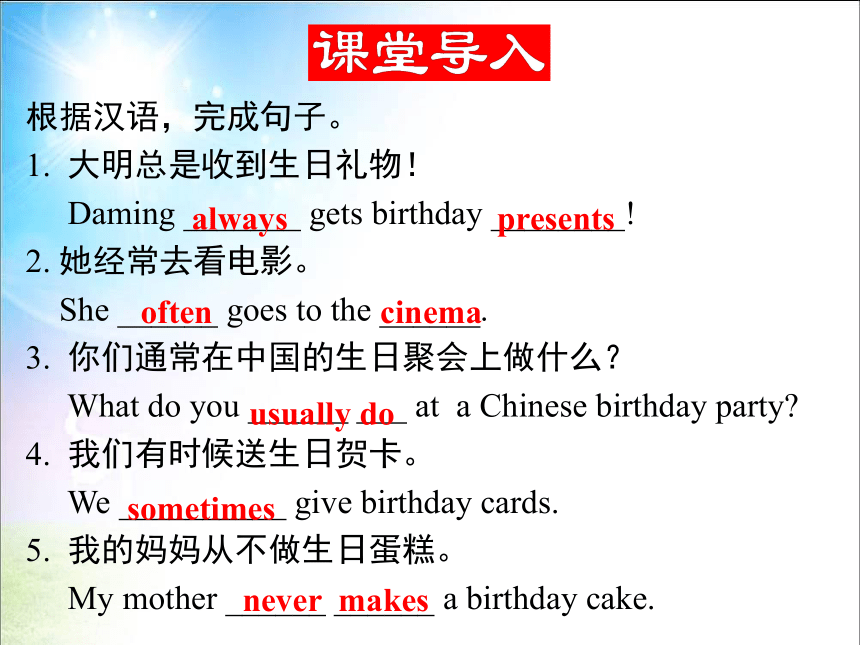

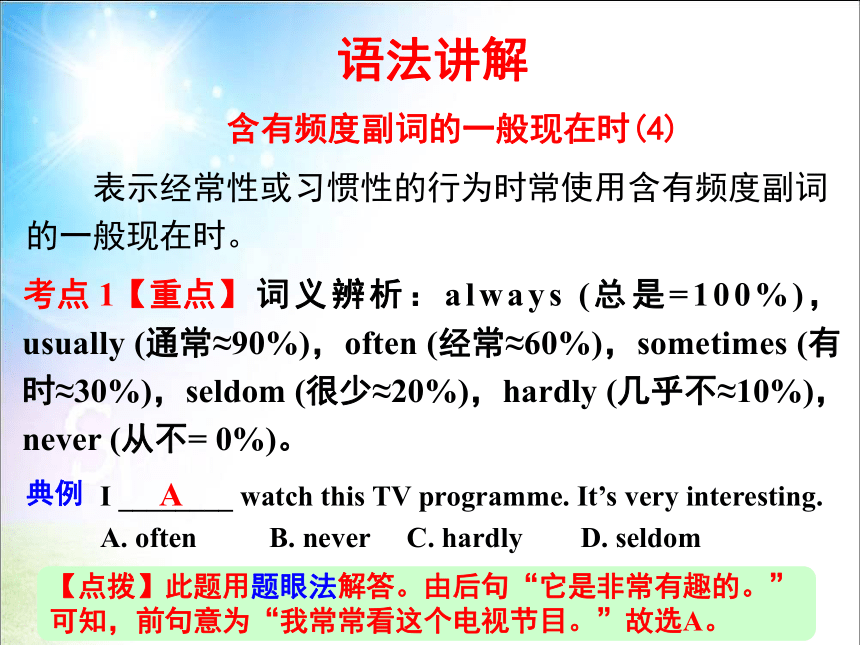
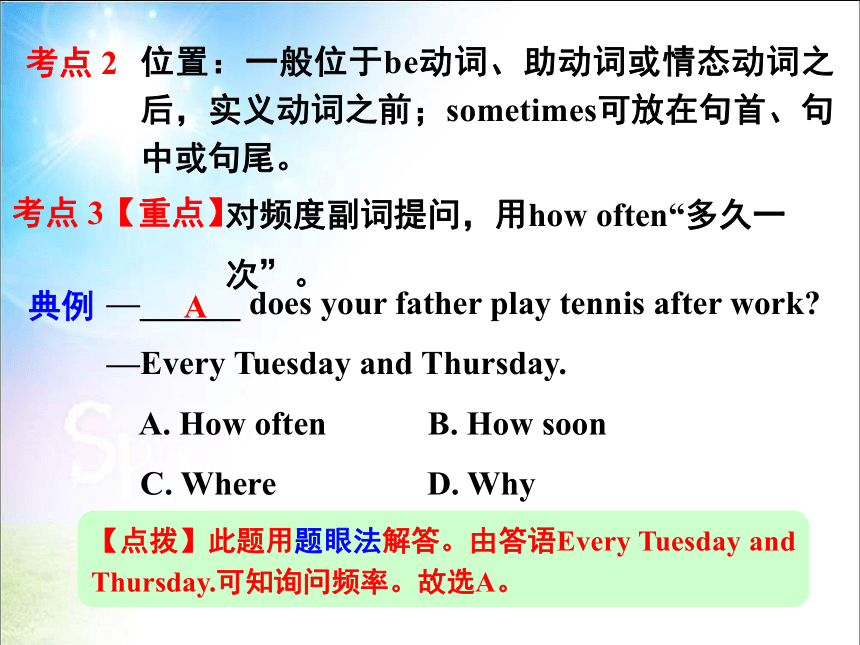
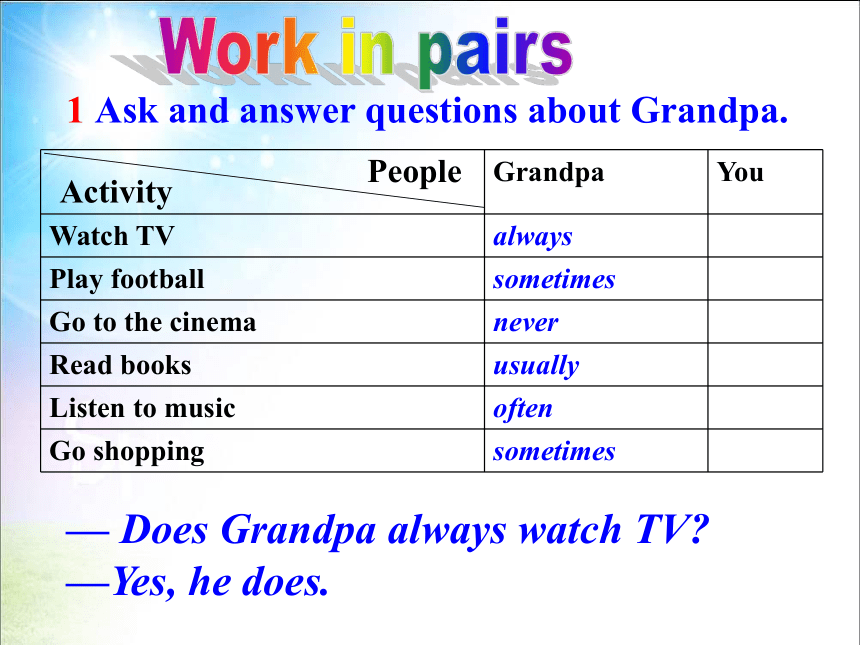
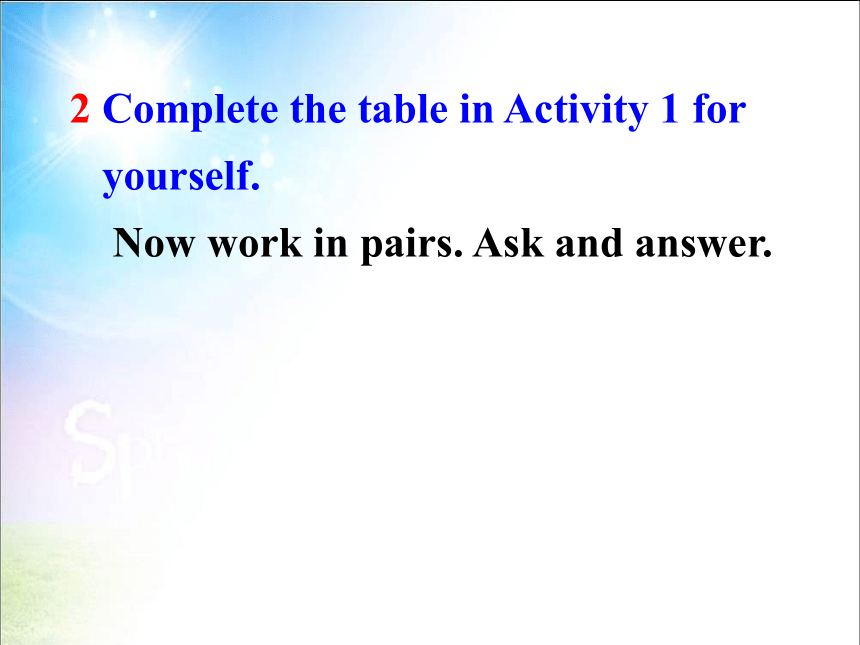
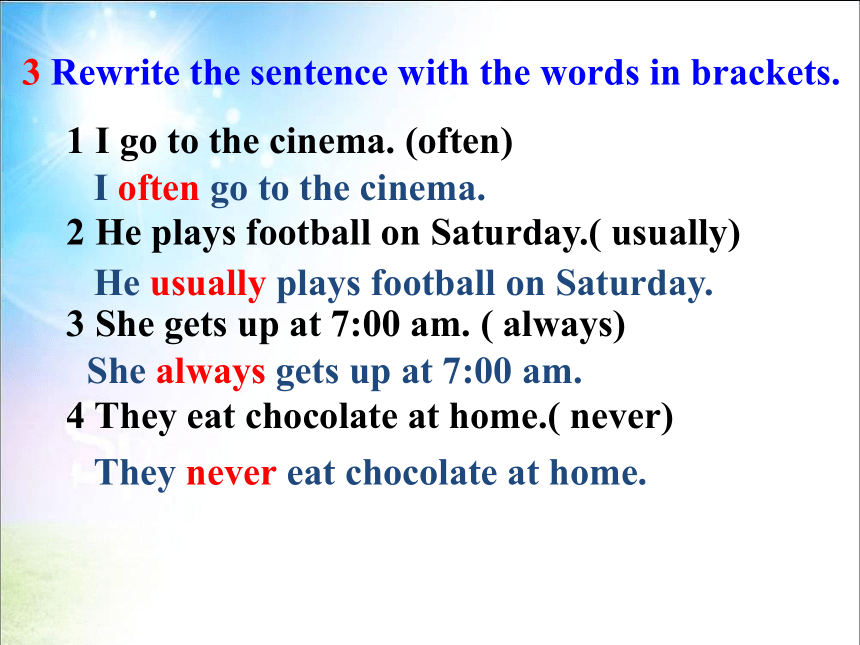


文档简介
(共47张PPT)
根据汉语,完成句子。
1. 大明总是收到生日礼物!
Daming _______ gets birthday ________!
2. 她经常去看电影。
She ______ goes to the ______.
3. 你们通常在中国的生日聚会上做什么?
What do you ______ ___ at a Chinese birthday party
4. 我们有时候送生日贺卡。
We __________ give birthday cards.
5. 我的妈妈从不做生日蛋糕。
My mother ______ ______ a birthday cake.
always presents
often cinema
usually do
sometimes
never makes
Daming always gets birthday presents!
She often goes to the cinema.
What do you usually do at a Chinese birthday party
We sometimes give birthday cards.
My mother never makes a birthday cake.
含有频度副词的一般现在时(4)
语法讲解
表示经常性或习惯性的行为时常使用含有频度副词的一般现在时。
词义辨析:always (总是=100%),usually (通常≈90%),often (经常≈60%),sometimes (有时≈30%),seldom (很少≈20%),hardly (几乎不≈10%),never (从不= 0%)。
考点 1【重点】
典例
I ________ watch this TV programme. It’s very interesting.
A. often B. never C. hardly D. seldom
【点拨】此题用题眼法解答。由后句“它是非常有趣的。”可知,前句意为“我常常看这个电视节目。”故选A。
A
位置:一般位于be动词、助动词或情态动词之后,实义动词之前;sometimes可放在句首、句中或句尾。
考点 2
对频度副词提问,用how often“多久一次”。
考点 3【重点】
典例
—______ does your father play tennis after work
—Every Tuesday and Thursday.
A. How often B. How soon
C. Where D. Why
【点拨】此题用题眼法解答。由答语Every Tuesday and Thursday.可知询问频率。故选A。
A
1 Ask and answer questions about Grandpa.
Grandpa You
Watch TV always
Play football sometimes
Go to the cinema never
Read books usually
Listen to music often
Go shopping sometimes
People
Activity
— Does Grandpa always watch TV
—Yes, he does.
2 Complete the table in Activity 1 for
yourself.
Now work in pairs. Ask and answer.
3 Rewrite the sentence with the words in brackets.
1 I go to the cinema. (often)
2 He plays football on Saturday.( usually)
3 She gets up at 7:00 am. ( always)
4 They eat chocolate at home.( never)
I often go to the cinema.
He usually plays football on Saturday.
She always gets up at 7:00 am.
They never eat chocolate at home.
4 Complete the sentences with Would you like… or Let’s.
Would you like to go to the playground and play football
1 ______________ to go to the football match
2 _____ go to a taijiquan class.
3 _____ stay at home.
4 ______________ to go to the cinema
It’s Jackie Chan.
5 ______________ to watch TV
6 _____ play basketball.
Would you like
Let’s
Let’s
Would you like
Would you like
Let’s
Would you like+to do sth.
Let’s +do sth.
两者都用于表示请求或建议。
Hi Mike,
Thanks. I’d like to come.
See you then.
Jane
Dear all,
My birthday party is at four o’clock on Saturday evening at my house. Would you like to come
Mike
It’s great to hear from you Mike, but I’m afraid I can’t come. I always watch my little sister play football on Saturday evening.
Jack
5 Read the emails and check (√) the true sentences.
1. Mike’s birthday party begins
at 4:00 pm.
2. Jane doesn’t want to go to the party.
3. Jack has got a little sister.
4. Jack always does his homework on Saturday afternoon.
√
×
×
√
知识点
1
hear /h / v.听见
辨析hear和listen
hear及物动词,强调听的结果,无进行时态。
listen不及物动词,强调听的过程,但不一定听到,有进行时态;可以单独使用,也经常和to连用,后接名词。
考向一
一语辨异:I listen to the old woman, but I can’t hear anything. 我仔细听那位老妇人讲话,但我什么也不能听到。
魔法记忆
hear from 为固定短语,意为“收到……的来信”,与get/receive a letter from同义。
考向二
拓展
hear of/about 听说;hear out 听完
—Have you ________ Zhang Lili
—Yes, she is the most beautiful woman teacher
in China.
A. heard of B. heard from C. heard out
典例
【点拨】此题用正确把握语境法解答。根据句意“你________ 张丽丽吗?”“听过,她是中国最美丽的女教师。”可知,此空用“听说”。故选A。
A
知识点
2
afraid / 'fre d/ adj.担心的;害怕的
“I’m afraid so/not.”常用在日常交际中,意为“恐怕是这样/不是这样。”
考向一
—Excuse me. Is the library open all day
—________. Only from 9 a.m. to 4 p.m.
A. Yes, of course B. That’s right
C. Sorry, I’m afraid not D. Sorry, I’m not sure
典例
【点拨】此题用题眼法和删除干扰部分法解答。根据问句中的“all day”和答语中的“Only”可知图书馆不是全天开放,所以排除A项和B项;干扰项D项意为“对不起,我不确定。”和后一句答语“只从上午9点到下午4点开放。”前后矛盾,所以排除。故选C。
C
“be afraid of”后接名词或动词的 -ing形式,意为“害怕某物;害怕(做)某事”。
eg:My sister isn’t afraid of snakes. 我的妹妹不害怕蛇。
考向二
I’m ________ of the dark. That’s why I always go to sleep with the light on.
典例
afraid
“be afraid to do sth.”意为“不敢做某事”。
eg:The child is afraid to go out at night.
这个孩子不敢夜晚外出。
考向三
“I’m afraid+(that)...”意为“恐怕……”,常用于有礼貌地拒绝他人。
eg:I’m afraid (that) I can’t go to the zoo with you this
Sunday. 恐怕这个星期日我不能和你一起去动物园。
考向四
知识点
3
watch my little sister play football看我的小妹妹踢足球
辨析watch sb.do sth.和watch sb. doing sth.
考向
watch sb. do sth.意为“看某人做某事”。
watch sb. do sth. 侧重动作的全过程,意为“看某人做了某事”。
eg:I watch Lucy walk into the room.
我看到露西走进了房间。
watch sb. doing sth. 侧重动作正在进行中,意为“看某人正在做某事”。 eg:When I walk past the room,I watch Lucy playing the piano. 我走过房间时,看到露西正在弹钢琴。
拓展
感官动词see“看见”,hear“听见”等也有类似的用法。
When I play in the park, I always watch the old people ________ Chinese Taiji.
A. play B. plays C. played D. playing
典例
【点拨】此题用正确把握语境法解答。根据前半句“当我在公园里玩时”和后半句“我总是观看老人们________ 中国太极”可知,此空应表示“观看老人打中国太极的全过程”。故选A。
A
送...作为礼物
give … as presents
Module task: Planning a classmate’s birthday party
6 Work in pairs. Ask and answer questions about each other’s birthday party.
1. When is your birthday
2. Do you always have a birthday party
3. What do you usually do at your birthday
party
7 Plan a birthday party for your partner.
Choose the time and place.
Choose the food.
Choose what to do.
8 Work with the whole class. Describe your
plans for your partner’s birthday party.
Don’t say who your partner is.
Now guess who your partner is.
小结提升。
这节课我学到了:
1. 复习巩固单元内所学词汇;
2. 能正确运用一般现在时介绍他人的爱好。
一、用所给词的适当形式填空。
1. Tom often _____ (have) lunch at school.
2. Kate ___________ (not do) her homework after dinner.
3. Mother never ______ (make) a birthday cake for me.
She always ______ (buy) me a big one.
4. — Does your sister often _____ (play) computer games
— No, never.
5. She often _____ late with her mom to watch movies. (stay)
has
Doesn’t do
makes
buys
play
stays
二、单项选择。
6. —Do you like watching TV, Kate
—Yes, I ________ TV in the evening.
A. never watch B. watch often
C. watch usually D. always watch
D
【点拨】用语法判定法。由答语中的“Yes”可排除A项,often, usually, always常放在实义动词前面,故选D。
7. The weather ________ fine in July.
A. usually is B. is usually
C. usually D. usually be
【点拨】此题考查频度副词的位置。频度副词一般用在系动词、助动词之后,行为动词之前。故选B。
B
9. —What does he usually do on Saturday
—He usually ________ shopping with his mother.
A. goes B. go C. will go D. has gone
A
【点拨】根据前后时态一致原则,问句为一般现在时,故答语也要用一般现在时,故选A。
10.Ms Lin always walks to work. She ______ takes a bus to work.
A. never B. always C. often D. usually
A
【点拨】题眼法。由hate可知是很少吃或不吃,故选B。
8. —I hate (讨厌) vegetables. I ______eat them.
—But they are good for your health!You should
eat them every day.
A. always B. seldom C. often D. usually
B
三、按要求改写句子
11. She always makes a big birthday cake for Tom. (改为完全否定句)
She _______ _______ a big birthday cake for Tom.
12. He has lunch at school. (在句中加入sometimes)
He ____________ ______ lunch at school.
13. They don’t speak Chinese at home.(改为单数句)
He ________ ________ Chinese at home.
14. Fred plans to work in the charity hospital in the community.
(改为否定句)
Fred________ ________ to work in the charity hospital in the
community.
15. The two boys sometimes play computer games. (对画线部分提问)
______ _______ do the two boys play computer games
never makes
sometimes has
doesn’t speak
doesn’t plan
How often
【点拨】此题考查对频度副词提问的疑问词组。对频度副词提问用疑问词组how often,表示“多久一次”。
Homework
1. 抄写单词,每个3遍,每个短语3遍,意思一遍。
2. 读熟U1的对话,U2的短文,记住本模块所学单词、短语、句型和知识点。
3. 完成本单元的练习册。
4. 预习下节课的内容。
根据汉语,完成句子。
1. 大明总是收到生日礼物!
Daming _______ gets birthday ________!
2. 她经常去看电影。
She ______ goes to the ______.
3. 你们通常在中国的生日聚会上做什么?
What do you ______ ___ at a Chinese birthday party
4. 我们有时候送生日贺卡。
We __________ give birthday cards.
5. 我的妈妈从不做生日蛋糕。
My mother ______ ______ a birthday cake.
always presents
often cinema
usually do
sometimes
never makes
Daming always gets birthday presents!
She often goes to the cinema.
What do you usually do at a Chinese birthday party
We sometimes give birthday cards.
My mother never makes a birthday cake.
含有频度副词的一般现在时(4)
语法讲解
表示经常性或习惯性的行为时常使用含有频度副词的一般现在时。
词义辨析:always (总是=100%),usually (通常≈90%),often (经常≈60%),sometimes (有时≈30%),seldom (很少≈20%),hardly (几乎不≈10%),never (从不= 0%)。
考点 1【重点】
典例
I ________ watch this TV programme. It’s very interesting.
A. often B. never C. hardly D. seldom
【点拨】此题用题眼法解答。由后句“它是非常有趣的。”可知,前句意为“我常常看这个电视节目。”故选A。
A
位置:一般位于be动词、助动词或情态动词之后,实义动词之前;sometimes可放在句首、句中或句尾。
考点 2
对频度副词提问,用how often“多久一次”。
考点 3【重点】
典例
—______ does your father play tennis after work
—Every Tuesday and Thursday.
A. How often B. How soon
C. Where D. Why
【点拨】此题用题眼法解答。由答语Every Tuesday and Thursday.可知询问频率。故选A。
A
1 Ask and answer questions about Grandpa.
Grandpa You
Watch TV always
Play football sometimes
Go to the cinema never
Read books usually
Listen to music often
Go shopping sometimes
People
Activity
— Does Grandpa always watch TV
—Yes, he does.
2 Complete the table in Activity 1 for
yourself.
Now work in pairs. Ask and answer.
3 Rewrite the sentence with the words in brackets.
1 I go to the cinema. (often)
2 He plays football on Saturday.( usually)
3 She gets up at 7:00 am. ( always)
4 They eat chocolate at home.( never)
I often go to the cinema.
He usually plays football on Saturday.
She always gets up at 7:00 am.
They never eat chocolate at home.
4 Complete the sentences with Would you like… or Let’s.
Would you like to go to the playground and play football
1 ______________ to go to the football match
2 _____ go to a taijiquan class.
3 _____ stay at home.
4 ______________ to go to the cinema
It’s Jackie Chan.
5 ______________ to watch TV
6 _____ play basketball.
Would you like
Let’s
Let’s
Would you like
Would you like
Let’s
Would you like+to do sth.
Let’s +do sth.
两者都用于表示请求或建议。
Hi Mike,
Thanks. I’d like to come.
See you then.
Jane
Dear all,
My birthday party is at four o’clock on Saturday evening at my house. Would you like to come
Mike
It’s great to hear from you Mike, but I’m afraid I can’t come. I always watch my little sister play football on Saturday evening.
Jack
5 Read the emails and check (√) the true sentences.
1. Mike’s birthday party begins
at 4:00 pm.
2. Jane doesn’t want to go to the party.
3. Jack has got a little sister.
4. Jack always does his homework on Saturday afternoon.
√
×
×
√
知识点
1
hear /h / v.听见
辨析hear和listen
hear及物动词,强调听的结果,无进行时态。
listen不及物动词,强调听的过程,但不一定听到,有进行时态;可以单独使用,也经常和to连用,后接名词。
考向一
一语辨异:I listen to the old woman, but I can’t hear anything. 我仔细听那位老妇人讲话,但我什么也不能听到。
魔法记忆
hear from 为固定短语,意为“收到……的来信”,与get/receive a letter from同义。
考向二
拓展
hear of/about 听说;hear out 听完
—Have you ________ Zhang Lili
—Yes, she is the most beautiful woman teacher
in China.
A. heard of B. heard from C. heard out
典例
【点拨】此题用正确把握语境法解答。根据句意“你________ 张丽丽吗?”“听过,她是中国最美丽的女教师。”可知,此空用“听说”。故选A。
A
知识点
2
afraid / 'fre d/ adj.担心的;害怕的
“I’m afraid so/not.”常用在日常交际中,意为“恐怕是这样/不是这样。”
考向一
—Excuse me. Is the library open all day
—________. Only from 9 a.m. to 4 p.m.
A. Yes, of course B. That’s right
C. Sorry, I’m afraid not D. Sorry, I’m not sure
典例
【点拨】此题用题眼法和删除干扰部分法解答。根据问句中的“all day”和答语中的“Only”可知图书馆不是全天开放,所以排除A项和B项;干扰项D项意为“对不起,我不确定。”和后一句答语“只从上午9点到下午4点开放。”前后矛盾,所以排除。故选C。
C
“be afraid of”后接名词或动词的 -ing形式,意为“害怕某物;害怕(做)某事”。
eg:My sister isn’t afraid of snakes. 我的妹妹不害怕蛇。
考向二
I’m ________ of the dark. That’s why I always go to sleep with the light on.
典例
afraid
“be afraid to do sth.”意为“不敢做某事”。
eg:The child is afraid to go out at night.
这个孩子不敢夜晚外出。
考向三
“I’m afraid+(that)...”意为“恐怕……”,常用于有礼貌地拒绝他人。
eg:I’m afraid (that) I can’t go to the zoo with you this
Sunday. 恐怕这个星期日我不能和你一起去动物园。
考向四
知识点
3
watch my little sister play football看我的小妹妹踢足球
辨析watch sb.do sth.和watch sb. doing sth.
考向
watch sb. do sth.意为“看某人做某事”。
watch sb. do sth. 侧重动作的全过程,意为“看某人做了某事”。
eg:I watch Lucy walk into the room.
我看到露西走进了房间。
watch sb. doing sth. 侧重动作正在进行中,意为“看某人正在做某事”。 eg:When I walk past the room,I watch Lucy playing the piano. 我走过房间时,看到露西正在弹钢琴。
拓展
感官动词see“看见”,hear“听见”等也有类似的用法。
When I play in the park, I always watch the old people ________ Chinese Taiji.
A. play B. plays C. played D. playing
典例
【点拨】此题用正确把握语境法解答。根据前半句“当我在公园里玩时”和后半句“我总是观看老人们________ 中国太极”可知,此空应表示“观看老人打中国太极的全过程”。故选A。
A
送...作为礼物
give … as presents
Module task: Planning a classmate’s birthday party
6 Work in pairs. Ask and answer questions about each other’s birthday party.
1. When is your birthday
2. Do you always have a birthday party
3. What do you usually do at your birthday
party
7 Plan a birthday party for your partner.
Choose the time and place.
Choose the food.
Choose what to do.
8 Work with the whole class. Describe your
plans for your partner’s birthday party.
Don’t say who your partner is.
Now guess who your partner is.
小结提升。
这节课我学到了:
1. 复习巩固单元内所学词汇;
2. 能正确运用一般现在时介绍他人的爱好。
一、用所给词的适当形式填空。
1. Tom often _____ (have) lunch at school.
2. Kate ___________ (not do) her homework after dinner.
3. Mother never ______ (make) a birthday cake for me.
She always ______ (buy) me a big one.
4. — Does your sister often _____ (play) computer games
— No, never.
5. She often _____ late with her mom to watch movies. (stay)
has
Doesn’t do
makes
buys
play
stays
二、单项选择。
6. —Do you like watching TV, Kate
—Yes, I ________ TV in the evening.
A. never watch B. watch often
C. watch usually D. always watch
D
【点拨】用语法判定法。由答语中的“Yes”可排除A项,often, usually, always常放在实义动词前面,故选D。
7. The weather ________ fine in July.
A. usually is B. is usually
C. usually D. usually be
【点拨】此题考查频度副词的位置。频度副词一般用在系动词、助动词之后,行为动词之前。故选B。
B
9. —What does he usually do on Saturday
—He usually ________ shopping with his mother.
A. goes B. go C. will go D. has gone
A
【点拨】根据前后时态一致原则,问句为一般现在时,故答语也要用一般现在时,故选A。
10.Ms Lin always walks to work. She ______ takes a bus to work.
A. never B. always C. often D. usually
A
【点拨】题眼法。由hate可知是很少吃或不吃,故选B。
8. —I hate (讨厌) vegetables. I ______eat them.
—But they are good for your health!You should
eat them every day.
A. always B. seldom C. often D. usually
B
三、按要求改写句子
11. She always makes a big birthday cake for Tom. (改为完全否定句)
She _______ _______ a big birthday cake for Tom.
12. He has lunch at school. (在句中加入sometimes)
He ____________ ______ lunch at school.
13. They don’t speak Chinese at home.(改为单数句)
He ________ ________ Chinese at home.
14. Fred plans to work in the charity hospital in the community.
(改为否定句)
Fred________ ________ to work in the charity hospital in the
community.
15. The two boys sometimes play computer games. (对画线部分提问)
______ _______ do the two boys play computer games
never makes
sometimes has
doesn’t speak
doesn’t plan
How often
【点拨】此题考查对频度副词提问的疑问词组。对频度副词提问用疑问词组how often,表示“多久一次”。
Homework
1. 抄写单词,每个3遍,每个短语3遍,意思一遍。
2. 读熟U1的对话,U2的短文,记住本模块所学单词、短语、句型和知识点。
3. 完成本单元的练习册。
4. 预习下节课的内容。
同课章节目录
- Starte
- Module 1 My teacher and my friends
- Module 2 My English lesson
- Module 3 My English book
- Module 4 My everyday life
- Module 1 My classmates
- Unit 1 Nice to meet you.
- Unit 2 I'm Wang Lingling and I'm thirteen years ol
- Unit 3 Language in use.
- Module 2 My family
- Unit 1 Is this your mum?
- Unit 2 These are my parents.
- Unit 3 Language in use.
- Module 3 My school
- Unit 1 There are thirty students in my class.
- Unit 2 The library is on the left of the playgroun
- Unit 3 Language in use.
- Module 4 Healthy food
- Unit 1 We've got lots of apples.
- Unit 2 Is your food and drink healthy?
- Unit 3 Language in use.
- Module 5 My school day
- Unit 1 I love history.
- Unit 2 We start work at nine o'clock.
- Unit 3 Language in use.
- Revision module A
- Module 6 A trip to the zoo
- Unit 1 Does it eat meat?
- Unit 2 The tiger lives in Asia.
- Unit 3 Language in use.
- Module 7 Computers
- Unit 1 How do I write my homework on the computer?
- Unit 2 When do you use a computer?
- Unit 3 Language in use.
- Module 8 Choosing presents
- Unit 1 I always like birthday parties.
- Unit 2 She often goes to concerts.
- Unit 3 Language in use.
- Module 9 People and places
- Unit 1 We're enjoying the school trip a lot.
- Unit 2 They're waiting for buses or trains.
- Unit 3 Language in use.
- Module 10 Spring Festival
- Unit 1 Are you getting ready for Spring Festival?
- Unit 2 My mother's cleaning our houses and sweepin
- Unit 3 Language in use.
- Revision module B
